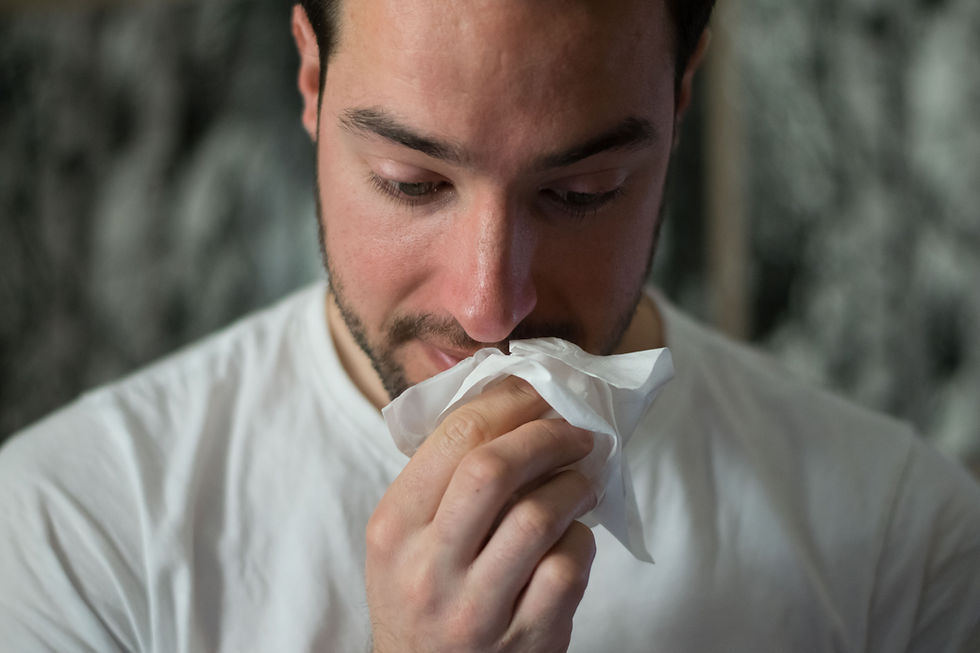There’s nothing like being knee-deep in rehearsals for an upcoming show and waking up one morning with a sore throat, a drippy nose, or feeling so tired you can't get out of bed.
Even just a hint of sickness can send any singer into crisis mode, and for good reason. A sick body often means a sick voice, after all. So how do we deal with it?

PREVENTION: THE FIRST STEP
First of all, "dealing" with sickness starts with good preventive care. There will be another entire post devoted to this soon, but for now, suffice it to say that if you're not taking care of your body, you are more susceptible to sickness, and less able to stave it off if it hits.
Learning to listen to your body's particular signals - i.e., cries for help - takes some time, but it's essential for knowing how you should care for yourself when and if you begin to experience symptoms. Everyone has his or her own regimen of remedies for sickness, so, as with anything health-related, do your own research, figure out what works for you, and seek help from a trusted health professional, if necessary.
SO, WHAT ABOUT SINGING?
In a perfect world, we would never have to sing while sick. Even in our imperfect world, you should avoid singing while sick if you possibly can. Alas, however, sometimes singers find themselves in a tough situation, and it can be hard to know what to do. There are no hard and fast rules for singing while sick. Everyone’s body is different, every virus is different, and sickness can be unpredictable.
DISCLAIMER: Before I go any further, the contents of this post are GUIDELINES ONLY. What I am about to say is based on my knowledge of vocal health/physiology and on my personal experience, but I am not an ENT or laryngologist. I cannot see your vocal folds and thus cannot and do not prescribe any specific course of action for your particular situation. Singing while sick can be a very risky business, and it’s imperative that you make the decision to do it under the guidance of someone who knows your voice well, and/or someone who can give you a proper diagnosis, if necessary. If you are unsure what to do, consult your teacher/coach, an ENT, or other qualified voice professional.

WHAT KIND OF SICKNESS IS IT?
Virtually all voice professionals would agree that you definitely should NOT sing if:
You have any malady that directly affects your throat or lower respiratory system (sore throat, swollen glands, strep throat, laryngitis, bronchitis, pneumonia, mono, or anything that manifests as an unpleasant, hacking cough).
You've been vomiting. That stuff really wreaks havoc on your vocal folds.
Your sickness otherwise severely inhibits the quality of your sound.
If your illness is basically a head cold (sinus congestion, runny nose, etc.), it MAY be okay to sing IF there is nothing wrong with your throat, your lungs, or your tummy. I’m not saying that singing with a head cold is a walk in the park, or that you won't feel exhausted after (and trust me, you will). But my point is that it could still be SAFE to sing – even if it’s not COMFORTABLE.
OTHER THINGS TO CONSIDER
Sometimes, especially in the head-cold situation, some areas of your voice will feel like they've been decimated, while others might feel like they're functioning more or less normally. So, if you come down with a cold right before a performance, audition, or competition, consider the kind of rep are you slated to sing: the vocal register(s) you will need, the tessitura and range of the music, and the demands it places on your voice and your body.
If your singing commitment is still a few days away, consider the trajectory your virus might take between now and then. If you’ve only got sinus congestion now but tend to end up with a yucky cough after a few days, it may be better to bow out if you can.

IF YOU CHOOSE TO SING WHILE SICK, REMEMBER:
Keep taking care of yourself. I cannot overemphasize hydration and good nutrition enough. Stay away from caffeine and alcohol. Use a steamer and humidifier. Use whatever voice-friendly remedies will mitigate your symptoms and help you recover faster. Rest your voice and sleep as much as you can. Cancel other obligations, if possible. Singing while sick is no joke, and takes a LOT of energy, so you will need to conserve as much as you possibly can.
Your sick voice is not going to sound or feel like your healthy voice. Don’t beat yourself up for sounding “less than your best.” Instead, just sing with the best technique you can, and go by feeling, not by sound.
Don’t overdo it. Your sick voice will not have the stamina that your healthy voice has, period. This often means making modifications in performance - using a lighter mechanism, more breath, or omitting high notes, if the situation allows. If you sing too much or too heavily when you are sick, you will pay for it for it, sometimes for days afterward. So be very, very careful.
The stronger your technique, the more successfully you will be able to sing while sick. This is why we practice: so that when conditions are less than optimal, we can still sing healthily and beautifully. If you feel like you're not there yet, fear not: keep working hard at your technique under the guidance of a good teacher, and you'll get there eventually.
Remember, if you are unsure what to do, consult with your voice teacher, or another trusted voice professional, preferably one who knows your voice well. He or she will be able to guide you toward a decision that will be healthy and safe for your instrument.
This post was adapted from an earlier version originally published by the author at rising-stars-productions.com.

Comments